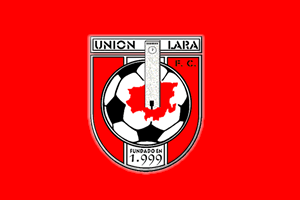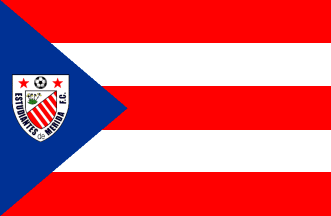
by Zachary Harden, 20 December 2004

Last modified: 2004-12-22 by dov gutterman
Keywords: venezuela | lara | sport | football | merida |
Links: FOTW homepage |
search |
disclaimer and copyright |
write us |
mirrors
See also:

by Zachary Harden, 20 December 2004
The Flag - Attributes and Semiology: Consists in a field with
approximated ratio 2:3; this is, square and half of length with
red wine background and the Coat of Arms of the Federation on the
center. Until the time of the redaction of this report is not
available data about the semiology of this flag. However, the
color red color is associate to the idea of courage, anger,
intrepidity and sacrifice,
Historical Synthesis: Although seems to exist several opinions
about the matter, the official version indicates that the use of
red wine as emblematic color of the Federation and the National
Selection of Football (Soccer) goes back to 1938 when a
Venezuelan Sport Delegation attended for first time and
international multidisciplinary event; in this case, the
"Bolivarian Games" in Bogota, Colombia and
consequently, the International Olympic Committee asked for the
authorities of National Institute of Sports to determine its
uniform, which was established as red wine t-shirt and gray
trousers. Also is commented that the election of colors obeyed to
the point of view of then President of the Institute: a
high officer of the National Guard, organism whose emblematic
color is dark red or Bordeaux red. From there, the red wine has
come fortifying as Venezuelan international sport color, with
remarkable presence in the uniforms of national selections in
another sport disciplines and consolidating more and more like a
specie of of additional emblematic international color of
Venezuela, including also institutions and activities of another
nature.
The remarkable performance that our National Football Selection
has come demostrating lately, has come arising a patriotic
adhesion and proud feeling which are expressed in diverse dress
articles and souvenirs which derives from the team's official
t-shirts and naturally, with the appearance of flags like
previously described.
Coat of Arms - Attributes: Consist in an English shape tierced in
fesses of Or (yellow), Azure (blue) and Gules (red) disposed from
the dexter to the sinister, charging respectively on the Chief
the initials "F", "V" and "F" in
gothic capital letters in Argent (white) outlined in Sable
(black). Completes the design, a foot-ball in Argent (white)
outlined in Sable (black) on the point of pretension.
Semiology: Although until the moment of the redaction of this
report is not available official data about the matter, is
possible to infer the semiology of this Coat of Arms because is
heraldically qualified as "Canting Arms". The three
fesses remind the Venezolanity; the initials allude to the
official denomination of the entity "FEDERACIÓN VENEZOLANA
DE FÚTBOL" (Venezuelan Football Federation) and the
foot-ball naturally represents the sport that constitutes its
object.
Historical Synthesis: Althought until the moment of the redaction
of this report is not available more data about the origin and
official adoption of this Coat of Arms, it was possible to
known that it was created during the management of General Jones
Parra as president of the Venezuelan Federation of Football on
1926.
Sources: Contributions of Mr. Jorge Polished of
the Planetavinotinto.com Vestibule, "Why that color?",
Article of Mr. Cristóbal War published in Daily "El
Nacional" of Caracas, section B/1, Saturday November
30th, 2002, Contributions of Licenciate Zaily Goussat, Direction
of Press of Venezuelan Football Federation, April 15th, 2004.
Raul Orta, 27 May 2004

by Jose C. Alegria, 18 June 2002
At the website of Asociacion Civil Unión Lara Fútbol Club
<http://www.unionlarafc.com/es/>
( El Club, Simbolos), they include the club´s official flag.
Logo im the image is from High Quality Football Logos.
Jose C. Alegria, 18 June 2002

by Blas Delgado Ortiz, 12 August 2002
The flag of "Estudiantes de Merida Futbol Club".
Club's simbols at <www.forest.ula.ve/~pedroq/estsimb.htm>.
Jose C. Alegria, 13 August 2002